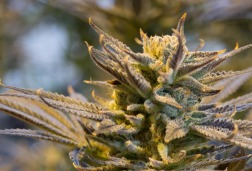
If your son or daughter were caught with cannabis, would you want them to receive a criminal conviction for it? Would the impact of that conviction not far outweigh any harm that they’ve done to others, society, or you?
The black mark of a cannabis conviction can impact heavily on people’s chances in life. The cost of a cannabis conviction far outweighs the harm of the actual act. Career opportunities can be curtailed, and jobs can be lost; take the example of Wiremu in this New Zealand Drug Foundation article. It’s just bad policy.

For young people, a drug conviction can marginalise them, pushing them towards not only more harmful patterns of drug use, but more harmful behaviour generally. Jarrod Gilbert, a sociologist at the University of Canterbury says, “If you tell someone they’re a criminal, they’re likely to start believing it. Once a young person is known to be a bad egg, they play up to that role.”
For someone older with family responsibilities, the loss of work that comes along with a conviction can mean the loss of their home and serious family stress, especially affecting children. We are not arguing that cannabis itself cannot be abused and contribute to job and relationship issues, but adding conviction as another harm is not productive. Abuse is a health problem, not a crime. These people need support, not a conviction. Why do we continue to think that criminalisation is the right way to deal with this?
For Māori particularly, prohibiting cannabis has negative outcomes. According to an article by Stuff.co.nz, Māori made up 40% of prosecutions and convictions for cannabis, and 51% of prison sentences between 2010-2014. They were offered diversion or pre-charge warnings far less than Pakeha as well. As police increasingly use discretion in choosing who to prosecute for minor cannabis offences, unconscious bias becomes more of a problem. A senior justice expert, quoted in a piece by the NZ Drug Foundation: ““Mäori are more likely to have a criminal record, less likely to be respectful of Police so more likely to be lippy. The officer is therefore less inclined to be lenient. It’s not a criticism of Police, it’s just how it works. Police use stereotypes to work out who they need to take action against, and that’s a source of bias and discrimination. Stereotypes are self-fulfilling prophecies; they always have some basis in experience, but they’re also discriminatory.”
And we haven’t even talked about the harm and injustice to medical users of the plant yet. The evidence of cannabis’ efficacy as an anti-nausea, anti-spasm medication is becoming overwhelming. For cancer sufferers, and those with MS or epilepsy, it can be a godsend. Thousands living in chronic pain are also finding relief from the use of  cannabis. And yet the police are still arresting those that grow their own medicine and those who help them. Thankfully, nearly 9 out of 10 Kiwis now think their fellows should be allowed access to medicinal cannabis, and both Labour and National have put forward bills on it.
cannabis. And yet the police are still arresting those that grow their own medicine and those who help them. Thankfully, nearly 9 out of 10 Kiwis now think their fellows should be allowed access to medicinal cannabis, and both Labour and National have put forward bills on it.
The idea that criminalising cannabis discourages use is questionable at best. We have some of the highest rates of cannabis use in the world and they have been stubbornly so, despite the police and the law’s attempts to lower them. Compare that with more liberal environments: the Netherlands has a past-year use rate of 5.4%, compared to New Zealand’s 14.6%, according to the U.N.
Proponents of prohibition point to the difference in regular usage rates between alcohol and cannabis as evidence that criminalising cannabis discourages its use. However, cannabis and alcohol are different drugs. One is drunk, the other is, most commonly, smoked. Why not compare cannabis with the legally smoked drug, tobacco? Doing so, we find usage rates nearly the same.
An actual conviction doesn’t discourage use either. A University of Otago study found that “there was no evidence of a reduction in cannabis use following arrest or conviction for the possession of cannabis.”
So, what are the other costs to society then?
Criminalisation causes harm to those seeking help for drug problems, including  cannabis. Fearing the involvement of the law, people who need help don’t get it or wait much longer to ask for it.
cannabis. Fearing the involvement of the law, people who need help don’t get it or wait much longer to ask for it.
The third is the distrust of police and disrespect towards the law cannabis prohibition creates. Over 300,000 New Zealanders regularly use cannabis. Instead of the police being someone to trust, they are someone to fear for this group of citizens. Over 65% of adults think cannabis should be decriminalised, in part because they believe the police have more valuable things to be doing. Instead of a law that hurts people and is a waste of police time, this majority of citizens want better public policy.
Reports from as early as the New York’s La Guardia report (1944) to the 2011 Law Commission report here in New Zealand have called for the decriminalisation of cannabis. The current policy, in so many ways, contradicts the basic aim of our National Drug Policy: harm reduction. From the policy:
 “Compassion is crucial. Help needs to be available for those who need it, interventions need to happen early, and the stigma that acts as a barrier to help seeking and recovery needs to be reduced. This National Drug Policy emphasises the need for a people-centred intervention system that is responsive to people’s circumstances, environment and life stages.
“Compassion is crucial. Help needs to be available for those who need it, interventions need to happen early, and the stigma that acts as a barrier to help seeking and recovery needs to be reduced. This National Drug Policy emphasises the need for a people-centred intervention system that is responsive to people’s circumstances, environment and life stages.
We also have to be prepared to challenge traditional approaches and ways of thinking about these issues. Innovation is essential in a world where new drugs are detected every week and the black market has gone digital. The international landscape has also shifted, with a growing recognition that the harms we are trying to prevent can come from our approach to drugs as much as from their use.”
Peter Dunne, Associate Health Minister (italics mine)
It’s far beyond time the politics caught up with the rhetoric. A clear majority of New Zealanders understand what poor policy prohibiting cannabis is and are looking for change. If you take one thing away from this, it is that the costs of a cannabis conviction far outweigh the harms related to its use.
Sources:
Barnett, Randy E. (2009) The Harmful Side Effects of Drug Prohibition. https://docplayer.net/23700274-The-harmful-side-effects-of-drug-prohibition.html Accessed: 21 August, 2018
Bingham, Eugene & Penfold, Paula (2016). Our Racist Justice System. http://www.stuff.co.nz/national/crime/84346494/New-Zealands-racist-justice-system-Our-law-is-not-colour-blind? Accessed: 25 August, 2018
Fergusson, D., & Boden, J. (2011). Cannabis use in adolescence. In P. Gluckman & H. Hayne (Eds.), Improving the transition: Reducing social and psychological morbidity during adolescence: A report from the Prime Minister’s Chief Science Advisor. (pp. 257-271). Auckland, New Zealand: Office of the Prime Minister’s Science Advisory Committee.
Available online: https://www.otago.ac.nz/christchurch/otago018744.pdf. Accessed: 21 August 2018
Hoyle, Craig (2018). Medicinal cannabis users ‘frantic’ after NZ Post dobs in prominent supplier. https://www.stuff.co.nz/national/crime/97772007/medicinal-cannabis-users-frantic-after-nz-post-dobs-in-prominent-supplier. Accessed: 22 August, 2018
Ministry of Health. National Drug Policy 2015-2020. https://www.health.govt.nz/system/files/documents/publications/national-drug-policy-2015-2020-aug15.pdf. Accessed: 12 August, 2018
National Academies of Sciences, Engineering, and Medicine. (2017). The Health Effects of Cannabis and Cannabinoids: The Current State of Evidence and Recommendations for Research. http://nationalacademies.org/hmd/~/media/Files/Report%20Files/2017/Cannabis-Health-Effects/Cannabis-conclusions.pdf. Accessed: 23 August, 2018
NZ Drug Foundation (2014). How well are pre-charge warnings working? https://www.drugfoundation.org.nz/matters-of-substance/november-2014/pre-charge-warnings-working/. Accessed: 25 August, 2018
NZ Drug Foundation (2016). There’s something wrong with the sentences. https://www.drugfoundation.org.nz/matters-of-substance/november-2016/sentencing-wrongs/. Accessed: 19 July, 2018
NZ Herald (2018). New poll shows big jump in support for cannabis reform, especially for medicinal use. https://www.nzherald.co.nz/nz/news/article.cfm?c_id=1&objectid=12093960. Accessed: 22 August, 2018
NZ Herald (2018). Kids smoking dope don’t need less education, they need more. https://www.nzherald.co.nz/index.cfm?objectid=12043524. Accessed: 23/08/2018
NZ Law Commission. (2011) Controlling and Regulating Drugs : A Review of the Misuse of Drugs Act 1975. http://www.lawcom.govt.nz/sites/default/files/projectAvailableFormats/NZLC%20R122.pdf. Accessed: 21 August, 2018
UNODC. (2011) World Drug Report. http://www.unodc.org/documents/data-and-analysis/WDR2011/World_Drug_Report_2011_ebook.pdf. Accessed 26 August, 2018

2 thoughts on “Why regulate? #1: Criminalising people is ineffective and only adds harm”